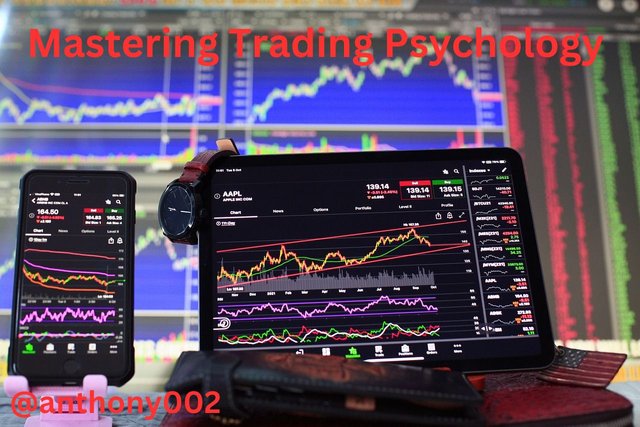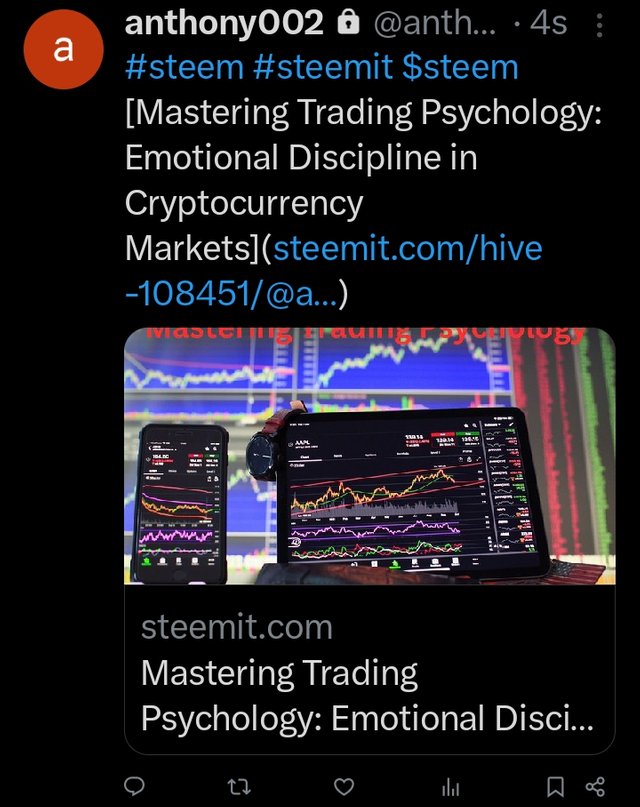Hello, Steemit community! Today, I'm sharing my insights on [Mastering Trading Psychology]. Let's dive in!
- Question 1:
Identifying Emotional Triggers in Trading
Discuss common emotional triggers (e.g., fear, greed, overconfidence) that affect traders. Provide examples of how these emotions manifest during market movements.
Common emotional triggers in trading include:
A. Fear: The fear of losses, fear of missing out (FOMO), or fear of market volatility.
- Example:
For instance, I, as a trader, sold my position prematurely due to fear of a potential downturn. And since the market is volatile, fluctuations mostly happen.
B. Greed: Excessive desire for profits, leading to overtrading or holding onto positions too long.
I'm the definition of greed ngl because there was a time that I was on live trade on Xauusd pair I remembered it was a long position and I was on profit massively around $100+ the trade was about like some few pips to my TP I refused to close it because I wanted to smash TP and take my screenshot asap but I was so greedy that I lost everything, the trade went back to my entry and I didn't apply breakeven it hots my SL and I had to blame myself because I was too greedy, and it's very bad in the financial market and I hope I get better on this journey of mastering trading psychology.
That's why this course is very important to me. Regardless, thanks to our brilliant teachers for coming up with this unexpected, at the same time, wonderful course.
- Example: If a trader takes on excessive leverage, hoping to increase gains, but ultimately suffers significant losses.
C. Overconfidence: Having too much faith in one's trading abilities/analysis, leading to reckless decision-making. But it is good to believe in yourself and trust your analysis is either TP or SL one is assured; that's why I always spend more time on the chart and trade less to stay profitable.
- Example: If a trader ignores the risk management principles and opens multiple positions without proper analysis.
D. Anxiety: Feeling overwhelmed or stressed due to market uncertainty or trading performance.
- Example: A trader constantly monitors their positions, making impulsive decisions based on short-term market fluctuations. Especially when the market is just ranging without showing any possible ChoCh, I always get pissed off.
E. Revenge Trading: Attempting to recoup losses by making impulsive, high-risk trades.
- Example:
A trader enters a new position immediately after a loss, hoping to "get back" at the market.
This is one of the things I resist doing. By all means, I don't get revenge trades. If the market takes me out, that's all for that day.
I included "Revenge trading" because it also affects many traders a lot if you are not emotionally strong in the market you end up losing everything in the name of taking revenge, the best way to revenge trades is to go back to your trading view, spend more time and know what you are getting wrong because in the financial market you're just like a small kid trying to win a challenge again smart people that has all the potential it takes, but once you understand the game you don't panic.
Recognizing and managing these emotional triggers is crucial for traders to maintain a clear, rational mindset and make informed trading decisions.
- Question 2:
Overcoming Psychological Barriers
Share techniques to overcome psychological barriers like fear of missing out (FOMO), loss aversion, or overconfidence. Use examples relevant to Steem/USDT trading.
Here are some techniques to overcome psychological barriers in trading:
Overcoming FOMO (Fear of Missing Out)
a. Set clear trading goals: Define your investment objectives and risk tolerance to avoid impulsive decisions.
b. Use limit orders: Instead of buying/selling at market price, set limit orders to execute trades at predetermined levels.
c. Stay informed, not obsessed: Stay up-to-date with market news, but avoid constant monitoring, which can fuel FOMO.
Overcoming Loss Aversion
a. Set stop-loss orders: Establish a stop-loss level to limit potential losses and avoid emotional decision-making.
b. Focus on the process, not the outcome: Concentrate on executing your trading plan, rather than worrying about potential losses.
c. Reframe losses as opportunities: View losses as chances to learn and improve your trading strategy.
Overcoming Overconfidence
a. Maintain a trading journal: Record your trades, including successes and failures, to stay grounded and identify areas for improvement.
b. Stay humble: Recognize that trading is inherently uncertain and that even the best traders experience losses.
c. Continuously educate yourself: Stay updated with market analysis, trends, and strategies to avoid complacency.
Example: Steem/USDT Trading
Suppose you're trading Steem/USDT and experience FOMO when you see the price surging. To overcome this, you:
i. Review your trading plan and goals.
ii. Set a limit order to buy Steem/USDT at a predetermined level.
iii. Focus on your overall portfolio performance, rather than getting caught up in the happiness of a single trade.
By attaching these techniques, you can better manage psychological barriers and make more informed, rational trading decisions.
- Question 3:
Developing a Trading Routine
Propose a daily or weekly trading routine that includes psychological preparation, such as journaling trades, setting realistic goals, and practicing mindfulness.
Below is a proposed daily trading routine that incorporates psychological preparation:
Daily Routine
- Morning Reflection (15 minutes): Meditate, practice deep breathing, or engage in a mindfulness exercise to clear your mind.
- Review Trading Plan (10 minutes): Go through your trading goals, risk management strategies, and market analysis. Like I said earlier spend more time on the chart.
- Market Analysis (30 minutes): Study charts, news, and market trends to identify potential trading opportunities. By doing this you might see your setup.
- Trade Execution and Monitoring: Execute trades according to your plan.
- Trade Journaling (10 minutes): Record your trades, including your thought process, emotions, and outcomes.
- Evening Review (15 minutes): go through your trading performance, identifying what worked well and what didn't. All these are very important in one's trading journey.
In addition
i. Regular exercise, healthy eating, and sufficient sleep are essential for maintaining mental clarity and focus.
ii. Use a calendar, or task list to stay organized and focused.
iii. Review your trading routine regularly and make adjustments as needed to ensure effective and aligned with your goals.
- Question 4:
Case Study on Emotional Trading
Analyze a hypothetical or real-life scenario where emotions led to a significant trading mistake. Explain how emotional discipline could have prevented the loss.
Here's a case study:
Case Study: Emotional Trading Mistake
Meet Anthony, a retail trader with 5 months of experience. He's been trading Xauusd with reasonable success.
The Scenario
On a Monday morning, Anthony wakes up to find that the Xauusd has gapped down 100 pips due to unexpected economic news. His long position is now in a substantial loss.
Emotional Reaction
Anthony feels anxious and fearful, worrying that he'll lose all his profits. He hastily closes his long position, but then instantly opens a new short position, hoping to recoup his losses.
Outcome
The market quickly reverses, and the Xauusd surges 150 pips, causing Anthony to have an even greater loss on his short position.
Analysis
Anthony's emotional reaction led to a substantial trading mistake:
- Fear and anxiety: Anthony's emotions clouded his judgment, causing him to make many decisions.
- Lack of discipline: Anthony failed to stick to his trading plan and risk management strategy. Because of his lack of trading psychology.
- Revenge trading: Anthony's attempt to recoup losses led to an even greater loss.
Emotional Discipline
To prevent this loss, Anthony could have utilized emotional discipline:
- Take a break: Step away from the trading application to calm down and reassess the situation.
- Stick to the plan: Adhere to his trading plan and risk management strategy, avoiding so many decisions.
- Re-evaluate the market: Assess the market situation and adjust his trading plan thus, instead of making emotional decisions.
By fostering emotional discipline, Anthony could have avoided this significant trading mistake and kept his capital.
- Question 5:
Building Resilience in Volatile Markets
Discuss how to build mental resilience to handle high-stress trading environments, including techniques for staying focused during volatile conditions.
Building mental resilience is important for traders to handle high-stress trading environments. Below details review of some techniques to help traders build resilience and stay focused during volatile conditions:
1. Self-Awareness and Emotional Regulation
i. Acknowledge how your feelings during volatile markets.
ii. Identify specific emotions, such as fear, anxiety, or excitement.
iii. Use these techniques deep breathing, meditation, or physical exercise to manage emotions.
2. Mindfulness and Focus
i. Practice mindfulness exercises to enhance your ability to stay current and focused.
ii. Establish specific, achievable goals for your trading session.
iii. Use a pre-trade checklist to ensure you're focused and prepared. (Trading checklist
3. Risk Management and Preparation
i. _Develop clear risk management strategies, including stop-losses and position sizing, etc...
ii. Always be up-to-date with market news and trends, but resist excessive monitoring. (Stay informed, not obsessed)
iii. Predict market movements and create contingency plans.
4. Physical and Mental Well-being
i. Maintain a healthy lifestyle
ii. Take breaks
iii. Seek support from fellow traders, mentors, or mental health professionals.
Once again, thanks to the brilliant teachers, I have learned a lot from this course.
Respectfully I am inviting @josepha, @muhammad-ahmad, and @john247.
HAVE FUN AND STEEM ON


Post shared on X as shown in the screenshot
 x.com
x.com
Downvoting a post can decrease pending rewards and make it less visible. Common reasons:
Submit
Great initiative to organize such a competition on the importance of trading psychology! It will be very instructive for new and experienced traders.
Downvoting a post can decrease pending rewards and make it less visible. Common reasons:
Submit
Thank you! I'm glad you think so. Traders need to understand the psychological aspects of trading to make informed decisions and minimize emotional influences.
Downvoting a post can decrease pending rewards and make it less visible. Common reasons:
Submit